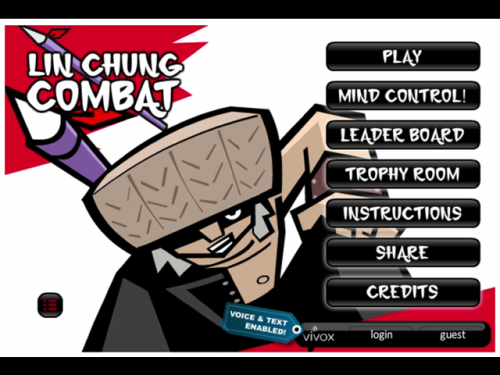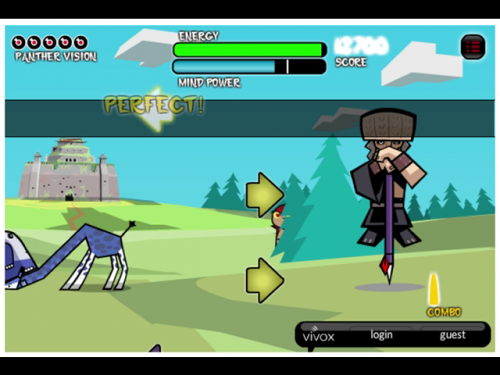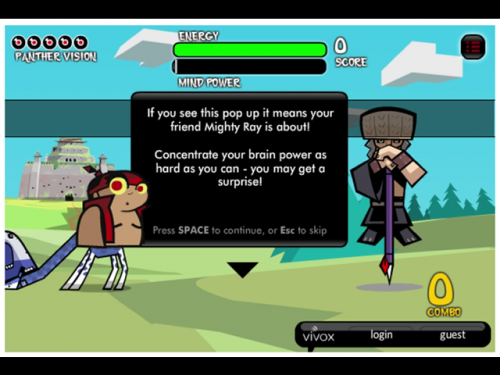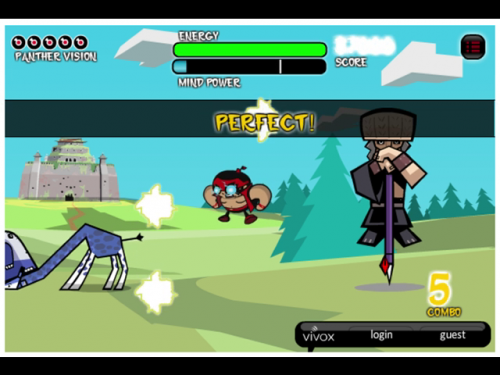
Lin Chung Combat is a Flash based BCI game developed by Moonscoop*. Lin Chung Combat is a rhythm game, similar in style to Dance Dance Revolution, which incorporates a neurofeedback game mechanic. Players are tasked with pressing certain arrow keys when they scroll over the horizontal black bar at the top of the game interface. Points are awarded when the player presses keys at the correct time and energy is lost when they don’t. The neurofeedback element takes the form of a special ability called Mighty Ray. Mighty Ray is a game character who hides in the scenery; when triggered he turns the player invincible for a short duration while adding a score multiplier to correct key presses.

This special ability uses the NeuroSky’s attention measure; in order to trigger the ability the player needs to fill up their Mind Power bar (the blue horizontal bar located under the energy bar) by focusing their attention (current level is displayed as a white vertical bar on the Mind Power bar, the further to the right the higher the player’s level of attention ). Once the player has maxed out their Mind Power the game will randomly decide whether or not to trigger the ability and will also reset the Mind Power bar requiring the player to fill it up once again.

As an early NeuroSky BCI game, the design of the neurofeedback mechanic is well thought out. Sensor information is displayed clearly to the player and the use of a cumulative attention reading rather than the immediate makes the mechanic much easier to control (see my post on manipulating NeuroSky measures). The random element to the Mighty Ray ability also makes for an interesting addition given brain control can sometimes be a bit random and has been previously suggested as a compensatory mechanic in the BCI game literature. That aside, the mechanic is a frustrating and superfluous addition to the gameplay making for a disappointing gaming experience.

The design of the Mighty Ray ability basically tasks the player to participate in a standard neurofeedback exercise, but this is an extremely trying experience while at the same time playing a rhythm game which requires quick reflexes and the player’s full and undivided attention in order to play. When I tried playing the game as intended, a quick death often followed as monitoring my current attention level, so I could regulate my brain activity, while focusing on the upcoming arrow keys was incredibly difficult. Similar to Neuronauts, the game does not provide players with any BCI training to help adjust to the new form of input control. It simply assumes the player will have both the necessary physical and mental skills to play from the get go which is a big oversight on the part of the developers. Instead of requiring the player’s active participation in manipulating their brainwaves the game would of been better served if the Mighty Ray ability was designed as a passive ability given active participation makes the game frustrating to play. Indeed if you treat the game mechanic as a passive ability (i.e. ignore the Mind Power meter and the attention level) and just let your Mind Power naturally fill up the game becomes significantly more playable. Although I find a randomly triggered special ability somewhat detracts from the gaming experience.
I found it strange that the game uses the attention rather than the meditation measure the NeuroSky provides. One would logically expect that a rhythm game would increase the player’s level of attention, therefore to ask player’s to move their attention level in the direction it is naturally expected to move seems redundant. It would of been better to ask player’s to relax in order to increase their Mind Power. This would naturally be antagonistic to the psychological state the game promotes thereby setting a challenge for the player to overcome (for more on this, see the Focus sword gameplay mechanic I describe here).
In summary, Lin Chun Combat implements a decent enough neurofeedback mechanic, it just wasn’t ideal for a rhythm game.
Additional Notes
- (*) The credits page oddly enough uses white text against a white background so I’m guessing the developer was Moonscoop.
- You can try out Lin Chun Combat here.